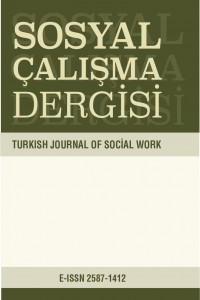Abstract
Sosyal hizmet etiğinin odağında kimler yer alır? Akademisyenlerin de içinde yer aldığı sosyal hizmet uzmanlarının tümü sosyal hizmet mesleğinin etik kurallarını izlemekle yükümlü olsa da, yükseköğretim sisteminde, sosyal hizmet akademisyenleri ile öğrencileri arasındaki güç farklılıklarının etik yönleri üzerinde yeterince inceleme yapılmamıştır. Buna karşın etikle ilgili inceleme ve araştırmalar çoğunlukla sahada çalışan sosyal hizmet uzmanının hizmet alanla mesleki ilişkisinden doğan konular veya sorunlara odaklanmıştır. Bu makale amacı, sosyal hizmet akademisyenleri ve öğrencileri arasındaki çok boyutlu profesyonel ilişkinin etik yönlerini tartışarak daha çok görünür hale getirmektir.
References
- Allen, K.N. ve Friedman, B.D. (2010). Affective learning: A taxonomy for teaching social work values. Journal of Social Work Values and Ethics, 7(2). Barretti, M. (2004). What do we know about the professional socialization of our students? Journal of Social Work Education, 40(2), 255- 283. Congress, E. P. (1996). Dual relationships in academia: Dilemmas for social work educators. Journal of Social Work Education, 32(3), 329-338. Miller, J. ve Koerin, B. (2001). Gatekeeping in the practicum: What field instructors need to know. The Clinical Supervisor, 20, 1–18. Otters, R. V. (2013). Social Work Education: Systemic Ethical Implications, Journal of Social Work Values & Ethics, 10(2), 58-69. Reamer, F. G. (2013). Social work values and ethics. Columbia University Press. Regehr, G., Bogo, M., Regehr, C. ve Power, R. (2007). Can we build a better mousetrap? Journal of Social Work Education, 43, 327–344. Sowbel, L.R. (2011). Gatekeeping in field performance: Is grade inflation a given?, Journal of Social Work Education, 47(2), 367-377. Taylor, M.F. (2007). Professional dissonance: A promising concept for clinical social work. Smith College Studies in Social Work, 77(1), 89-99. Tuncay, T. ve Duyan, V. (2015). “Turkish adaptation of the geriatric social work competency scale in a group of social work bachelor students”, Turkish Journal of Geriatrics¸ 18(1):60-67.
Abstract
Who is
at the center of social work ethics? All social workers, including academics,
are obliged to monitor the ethics of the social worker. However, in the higher
education system, the ethical aspects of the power disparities between social
work academics and students have not been adequately examined. Ethical reviews
and research are mostly focused on topics or issues arising from the
professional relevance of the social worker with their clients. This article
aims to discuss the ethical aspects of the multidimensional professional
relationship between social work academics and students.
Keywords
social work education social work educator social work ethics relationship ethics power differences
References
- Allen, K.N. ve Friedman, B.D. (2010). Affective learning: A taxonomy for teaching social work values. Journal of Social Work Values and Ethics, 7(2). Barretti, M. (2004). What do we know about the professional socialization of our students? Journal of Social Work Education, 40(2), 255- 283. Congress, E. P. (1996). Dual relationships in academia: Dilemmas for social work educators. Journal of Social Work Education, 32(3), 329-338. Miller, J. ve Koerin, B. (2001). Gatekeeping in the practicum: What field instructors need to know. The Clinical Supervisor, 20, 1–18. Otters, R. V. (2013). Social Work Education: Systemic Ethical Implications, Journal of Social Work Values & Ethics, 10(2), 58-69. Reamer, F. G. (2013). Social work values and ethics. Columbia University Press. Regehr, G., Bogo, M., Regehr, C. ve Power, R. (2007). Can we build a better mousetrap? Journal of Social Work Education, 43, 327–344. Sowbel, L.R. (2011). Gatekeeping in field performance: Is grade inflation a given?, Journal of Social Work Education, 47(2), 367-377. Taylor, M.F. (2007). Professional dissonance: A promising concept for clinical social work. Smith College Studies in Social Work, 77(1), 89-99. Tuncay, T. ve Duyan, V. (2015). “Turkish adaptation of the geriatric social work competency scale in a group of social work bachelor students”, Turkish Journal of Geriatrics¸ 18(1):60-67.
Details
| Subjects | Sociology (Other) |
|---|---|
| Journal Section | Articles |
| Authors | |
| Publication Date | December 28, 2017 |
| Acceptance Date | November 24, 2017 |
| Published in Issue | Year 2017 Volume: 1 Issue: 2 |



